Feedback materials
Feedback materials for practitioners wanting to bring type to life in a fun way
Our customers asked us to create materials that bring type to life, and that help users apply type within their everyday working lives. Discover these handy materials, available to buy now.
Make your virtual delivery as professional and interactive as your face-to-face sessions with our new and updated product range, including:
- Exploring your Myers-Briggs Type workbook - eBook
- Introduction to Myers-Briggs Type - eBook
- Myers-Briggs App
- Who are We type table
- Feedback cards
For further support with delivering virtually, head over to our dedicated page packed with articles, webinars and more.
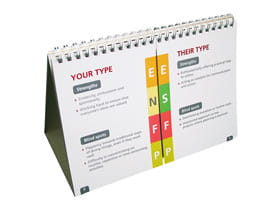 This quick-reference guide to type preferences is a creative and useful way of helping participants use type in their everyday working life. Give a Flip A Type Tip! to each person you give feedback to, and they can place it on their desk as a quick and easy reminder of what to expect when working with people of different types. Flip A Type Tip! gives users:
This quick-reference guide to type preferences is a creative and useful way of helping participants use type in their everyday working life. Give a Flip A Type Tip! to each person you give feedback to, and they can place it on their desk as a quick and easy reminder of what to expect when working with people of different types. Flip A Type Tip! gives users:
- Insight into strengths and blind spots of their own type – then displays a colleague’s type in comparison
- Advice about what to expect when working with a colleague – alongside tips for the qualities that they contribute
- In-depth tips on how to improve effectiveness when working together
It’s a flippin’ useful way of exploring type – see for yourself by watching our short video!
Buy Flip A Type Tips now (single pack or packs of 10)
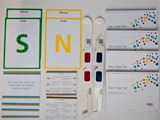
If you’ve ever wanted to run engaging and memorable group feedback events, this is the kit for you! For delivering group feedback, the group feedback kit sets you up with all the tools you need to introduce preferences and run short exercises. It is designed to be an off-the-shelf kit, enabling you to:
- Reduce preparation time for group feedback sessions
- Deliver resonant exercises that help participants quickly get to grips with type concepts
- Create a fun, experiential group event that ensures participants take away and use their learning
The kit contains materials for use with four participants, including a Flip A Type Tip (see above) per person, so that each participant will leave your feedback session with the power and tools to use type every day at work.
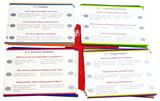 In a one-to-one feedback, every participant has the opportunity to explore personal examples of how they use their MBTI preferences. This helps them to understand their own MBTI type, and to appreciate the situations in which they choose to use each side of the preference pair.
In a one-to-one feedback, every participant has the opportunity to explore personal examples of how they use their MBTI preferences. This helps them to understand their own MBTI type, and to appreciate the situations in which they choose to use each side of the preference pair.
In a group feedback, exploring these personal examples is a challenge, as there is usually only one MBTI-qualified practitioner in the room, and many people for them to facilitate. These Scratchcards provide an ideal tool to enable participants to ask relevant questions and probes of each other, without having to involve the practitioner.
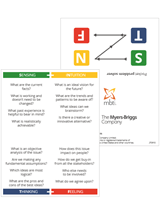
This handy credit card sized tool is a great takeaway for participants learning to apply type to improve decision making and problem solving. It presents an easy to grasp framework (sometimes called the Zig Zag model) to help balance natural preferences, and can be used as an easy reference when making decisions at work or at home.
The Pocket problem solver provides a neat reminder of the model along with questions relating to problem solving with each relevant preference. Use this tool alongside the reusable Problem solver posters to reinforce learning and encourage users to keep their learning active once they return to their everyday roles.
Buy Pocket Problem Solvers (packs of 10)
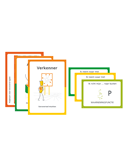
This set of 19 cards helps practitioners to easily explain type dynamics to their clients, providing an engaging and interactive way for someone to discover their own dominant, auxiliary, tertiary and inferior functions. This neatly presented pack is ideal for a follow-up to the first feedback session, and includes step-by-step instructions for how to use the cards.
By personifying each of the type functions as a different character, the cards allow users to recognise their core driver, and compare this to those of the people they work with. For practitioners, the cards provide the opportunity for better coaching conversations. These cards can be used in conjunction with the Core Character Poster.
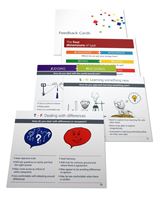 When giving a feedback session, it is helpful to have a number of ways of describing each of the preferences that bring them to life, including pictures, stories and anecdotes. These new feedback cards are an indispensable resource for the qualified practitioner, and can be readily integrated into any one-to-one feedback session.
When giving a feedback session, it is helpful to have a number of ways of describing each of the preferences that bring them to life, including pictures, stories and anecdotes. These new feedback cards are an indispensable resource for the qualified practitioner, and can be readily integrated into any one-to-one feedback session.
Packaged in a sturdy box, these feedback cards are designed to be used again and again to help deliver inspiring and impactful individual feedback sessions.
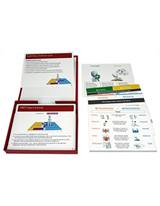 When giving a feedback session, it is helpful to have a number of ways of describing each of the preferences and associated facet areas to bring them to life. This can include pictures, stories and anecdotes. These new facet feedback cards are an indispensable resource for the qualified practitioner, and can be readily integrated into any one-to-one feedback session.
When giving a feedback session, it is helpful to have a number of ways of describing each of the preferences and associated facet areas to bring them to life. This can include pictures, stories and anecdotes. These new facet feedback cards are an indispensable resource for the qualified practitioner, and can be readily integrated into any one-to-one feedback session.
Packaged in a sturdy box, these facet feedback cards are designed to be used again and again to help deliver inspiring and impactful individual feedback sessions. For use with the MBTI Step II instrument.
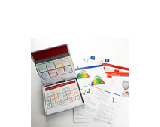 This set of 31 cards enables practitioners to apply the MBTI® framework to a variety of coaching situations. Richly illustrated and incorporating our Core Characters, they are a versatile tool to facilitate engaging coaching discussions.
This set of 31 cards enables practitioners to apply the MBTI® framework to a variety of coaching situations. Richly illustrated and incorporating our Core Characters, they are a versatile tool to facilitate engaging coaching discussions.
The cards are grouped into eight subsets, each of which can be used over a variety of successive sessions driven by the needs of the coachee.
The perfect next step to one-to-one feedback, these cards make it easy to tailor an impactful coaching programme around the needs of the client.
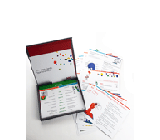
Embed Type dynamics into your coaching discussions with this set of 31 colour cards. A catalyst for meaningful conversations, they use our Core Characters™ to unlock one of the most unique and powerful aspects of the MBTI® tool.
The cards are grouped into seven subsets, each of which can be used over a variety of successive sessions driven by the needs of the coachee. Applications include understanding strengths, developing communication skills, and increasing awareness of responses to stress.
Colourfully illustrated with Core Characters™ these cards bring Type dynamics to life and they are a perfect next step to one-to-one feedback. They make it easy to tailor an impactful coaching programme around the needs of the client.
